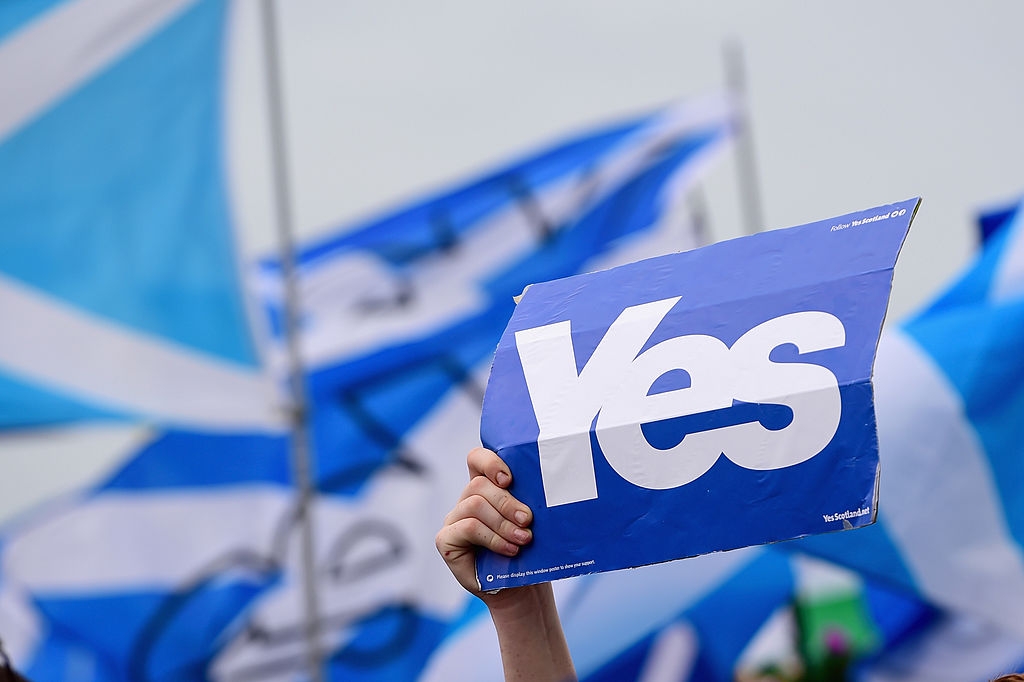Douglas Ross is the new leader of the Scottish Conservatives and since his predecessor lasted all of 167 days, best of luck might be more in order than congratulations. The Moray MP was awarded the position unopposed after Jackson Carlaw resigned entirely of his own volition and without any input from Downing Street. Ross inherits a party 35 points behind in the polls with a Holyrood election on the cards for next May. The SNP currently controls the Scottish parliament with the help of the nationalist Greens but, on present polling trends, would likely win a majority of seats in its own right.
Worse, during Carlaw’s tenure, support for Scexit — Scotland’s exit from the United Kingdom — crossed over into the majority. Nicola Sturgeon is under pressure from within her party to demand another referendum on secession and the SNP leader is certain to claim victory next May as a mandate. If all this wasn’t bad enough, the latest Tory leader is one of Scotland’s most high-profile football referees. Those poll ratings will be surging any time now.
Former leader Ruth Davidson will return to the front bench to lead for the Tories at First Minister’s Questions, with the aim that Ross will win a Holyrood seat at next May’s election. Davidson can be brutal in the debating chamber but brutality is what many Tories want to see. Carlaw was too much of a gentleman for their liking. The SNP suspects Ross is closer to Davidson in temperament and has already gone nuclear on him.
Ross is not who they should be worried about. What ought to trouble separatist high command is the drip, drip, drip of signs that the Prime Minister is coming to an understanding of how much peril the country is in. Whitehall insiders tell me Covid-19 has rudely awakened Downing Street to just how far devolution has taken Scotland down the path to full secession and how thoroughly it has leeched away Westminster’s powers. That it has taken so long to understand that devolution serves rather than hinders nationalism is damnable but what counts is what Boris Johnson does now.
The Prime Minister should accept the need for reform to repair New Labour’s well-intentioned errors. The readiest solution is to pass a new Act of Union defining the constitutional character of the UK and the locus of sovereignty as well as recalibrating the balance of powers between national, devolved and local government. This is most pressing in relation to Scotland, where secessionists have made the greatest progress, but there is every potential for the respective campaigns to remove Wales and Northern Ireland from the UK to make advances in the coming years. There is no sense in salving and bandaging the boil every decade or so. Lance it now.
As I have argued before, this is a constitutional imperative and a political one: Scottish secession poses commercial, diplomatic and national security dangers to the rest of the UK. As such, reforming devolution brings constitutional and political benefits, the latter including space for the non-nationalist parties in Scotland to break free from the parameters set by the SNP. As long as secession remains a possibility in the near or medium-term future, the Nationalists will retain their talon-like grip on at least half the electorate. Remove the possibility and their claws can slowly begin to be prised loose and politics in Scotland returned to a battle over schools, hospitals, jobs and prosperity. This is in the electoral interests of the Tories, Labour and Lib Dems but more importantly it is in the material interests of people living in Scotland.
Douglas Ross might be the right man to lead the Scottish Tories. He might even be the man to make them a viable party of government north of the border. I’ll be honest, I don’t have a clear enough reading of him yet to tell you what I think. What I will say is that none of this matters as long as devolution remains unreformed. Until that happens, Ross will be battling two other opposition parties for a pro-Union vote that has slipped below 50 per cent. To be in with a chance of ousting the SNP one day, the Scottish Tories must be able to take votes from electors of all constitutional viewpoints and that is unlikely to happen until the constitutional question is settled.







Comments